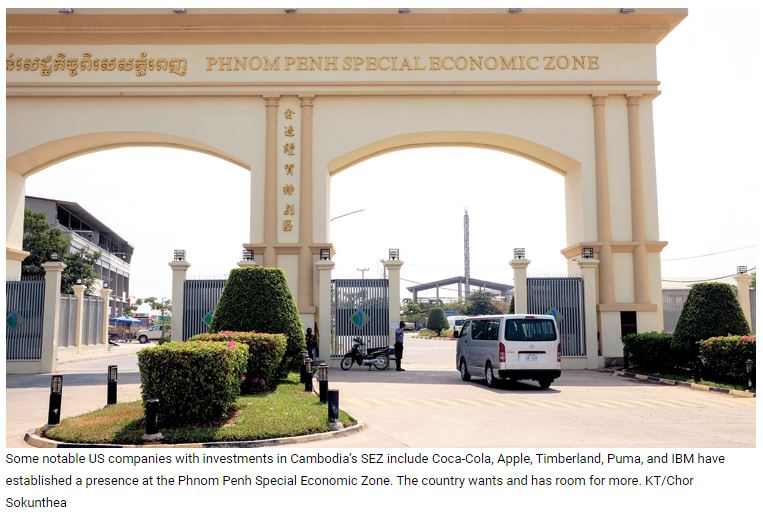Cambodia: Kingdom hopes its SEZs will lure more US firms
Cambodia’s special economic zones (SEZs) are among several Asean peers that boast potential opportunities for US investors, seeking to diversify their supply chains, according to a recent report conducted by an international service firm.
It said the bloc’s SEZs are playing an important role in facilitating greater trade between the region and the US through various fiscal and non-fiscal incentives, said Dezan Shira & Associates – a pan-Asia, multi-disciplinary professional services firm, providing legal, tax and operational advice to international corporate investors.
With an aim to emerge as a powerful trading bloc, Asean nations have been pushing special economic zones as a cornerstone, in a move to encourage more foreign direct investment (FDI).
SEZs have gained increasing prominence after the establishment of the ASEAN Economic Community in 2015, and it has become a critical tool to attract US investors looking to diversify their supply chain.
Cambodia boasts 31 SEZs nationwide, but only 17 special economic zones of them are active in the country – mostly along the border with Vietnam and Thailand.
According to the report, various tax incentives are available under these zones, ranging from 100 percent corporate income tax exemption for up to nine years to exemption from import and export duties.
Some notable US companies with investments in Cambodia’s SEZs include Coca-Cola, which opened a $100 million plant at the Phnom Penz SEZ (PPSEZ) in 2016. Since then, other brands, such as Apple, Timberland, Puma and IBM have established a presence at the PPSEZ, it noted.
Official figures from the US Census Bureau showed that bilateral trade between the two countries was recorded at roughly $2 billion during the first four months of the year, up 29 percent year-on-year.
Cambodia’s major products exported to the US market, according to Dezan Shira & Associates’s report, are mainly textiles and garments, leather products and footwear – accounting for more than $1 billion annually.
Lim Heng, vice-president of Cambodia Chamber of Commerce, said yesterday that the Council for the Development of Cambodia – a government arm responsible for overseeing investment – is working on law investment and regulation reform in order to incentivise foreign investors come to invest in the country.
“The government is making efforts in internal economic reform when it comes to luring foreign investment in terms of administration procedures, other related regulations, law and investments,” Heng said.
“The better regulation and law investment, the more FDI will be coming in,” he added, noting that
the soon-to-be FTA deal between Cambodia and China and similar future deals with other trade partners such as South Korea, the Eurasian Economic Union (EAEU) and Japan are additional strong points for the Kingdom.
However, he argued that more work needed to be done to strengthen the Kingdom in the region, including electricity prices, logistical matters and human resources. “Electricity and logistics have to be competitive, while more skilled labour is needed and to be strengthened,” he emphasised.
Heng noted tourism-related business, agriculture and manufacturing are a current potential investment for the US to invest in the Kingdom.
In an exclusive interview with Khmer Times, United States Ambassador Patrick Murphy, said US companies look for the fundamental rule of law.
“Rule of law is important while infrastructure is helpful, in terms of energy needs, cost of electricity,and the labour pool here, of course,” he said, arguing that Cambodia is doing well in some of these and has room for improvement in other areas.
“American brands are associated with quality – a kind of a gold standard – and they look for those fundamentals. That’s what we want to ask the government and authorities to work on – increasing the soundness of those fundamentals,” he said.
“I think in general, American companies look for the laws to back up their investment. You need an independent judiciary that can make sound legal decisions. Sometimes, business contracts have misunderstandings. Sometimes, there are issues with profits and taxes. Often, there are issues with customs in many countries,” he added.
Dezan Shira & Associates’s report also suggested that US investors looking to take advantage of SEZs in Asean should seek to develop a basic understanding before assessing factors that may affect their business.
Total two-way trade between Asean and the US reached $260 billion in 2018. The US is also Asean’s fourth largest trading partner, according to the report.
Source: https://www.khmertimeskh.com/50736045/kingdom-hopes-its-sezs-will-lure-more-us-firms/


 English
English




